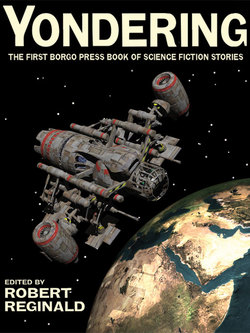Читать книгу Yondering - Jack Dann - Страница 4
На сайте Литреса книга снята с продажи.
ОглавлениеINTRODUCTION
“SUCH A SIMPLE REQUEST”
It seemed like such a simple request. My publisher wanted me to put together two anthologies featuring short stories by authors from my Borgo Press list. One of the books would include science fiction tales, and the other mystery pieces. The volumes would be distributed as near-gratis ebooks on the internet, with inexpensive print-on-demand versions as well, to help publicize some of the good folks who were publishing full-length books with us.
Easy, right? Well, yes and no.
Getting the material wasn’t difficult at all. I suddenly found myself overwhelmed with quality submissions, both reprints and originals. I quickly adopted a policy of only one story per writer per volume—and still they kept coming! In the end, I received sixty-three tales by sixty-six writers—thirty-seven SF and twenty-six crime stories. The total wordage was enormous. But the books had now become too large. So what to do?
“Divide them into more workable pieces,” was the suggestion, and so that’s what I’ve done. One SF volume became three: Yondering, To the Stars—and Beyond, and Once Upon a Future; and the crime book became Whodunit? and More Whodunits, with appropriate linking subtitles.
* * * *
This first anthology in the sequence, Yondering, includes a baker’s dozen of great pieces by fourteen writers. What struck me about this volume—and the others in the set—is the huge variety of themes, styles, and settings for the individual tales. There’s quite literally something here for just about everyone.
In “The Quills of Henry Thomas,” W. C. and Aja Bamberger give us a glimpse of a future in which music is created by DNA computing. “The Gizzard Wizard,” Rory Barnes’s sequel to his marvelous young adult SF novel, Space Junk, reintroduces those delightful characters, Em and Ned, now refugees fleeing a rundown future Earth. John Gregory Betancourt’s imaginative and engaging “The Darkfishers” features a shanghaied Earth colony stranded on the back of a huge crustacean on an ocean world. In “Guinea Pigs,” Sydney J. Bounds portrays a dystopian future in which the corporations dominate the world.
“Outside Looking In,” by Mark E. Burgess, takes the “world in a bottle theme”—and flips it on its head! Victor Cilincă’s “Siegfried” demonstrates quite clearly the danger of taking the “primitive” aliens too lightly. Michael R. Collings’s “The Calling of Iam’Kendron” is a stirring prequel to his classic fantasy novel, Wordsmith. In Arthur Jean Cox’s “Evergreen,” we find that long life is not always what it’s cracked up to be.
Jack Dann depicts, in “Mohammed’s Angel,” an all-too-plausible future in which cultures, sensibilities, and terrorism are inextricably mixed. “Ultra Evolution,” by John Russell Fearn, is a cautionary tale of the advancement of science and the advancement of man—not always a good thing! Sheila Finch’s “Miles to Go” is the moving story of a wheelchair marathoner presented with the choice of getting new legs. Mel Gilden relates mankind’s first encounter with an alien race in “The Little Finger of the Left Hand.” Finally, in Ardath Mayhar’s poignant “The Next Generation,” a nearly extinct human race must decide what its future will be.
—Robert Reginald
13 June 2011
